Sierra Leone, like other West African countries, is a resource-constrained context where many teachers face challenges in accessing quality teaching and learning materials. Approximately one-third of Sierra Leonean primary school teachers are unqualified (World Bank: 2023), and, as in other Sub-Saharan African countries, even those teachers with qualifications are generally trained inadequately, through programmes focusing on theory rather than practice and experience, and with no post-college support component (Bold et al., 2017; Akyeampong et al, 2011).
This is where AI can offer support that has an impressive impact. AI tools accessed on basic smartphones present an opportunity to bridge the digital gap. These tools can help teachers, even in remote communities, access accurate subject content and create engaging activities that transform the learning experience and make education more accessible.
For the last three years, EducAid has implemented several projects using AI tools to improve learning outcomes, including FabData in which we used their WhatsApp based tool TheTeacher.ai. EducAid is currently working with 300 partner schools across the country. As part of our reflection on this journey, we gathered responses from over 70 teaching staff on how AI has influenced their teaching practice and is impacting education in Sierra Leone. This sample included responses from primary and secondary school teachers, as well as those training and coaching primary and secondary school teachers in the Northern and Western parts of the country in 2024 and 2025.
Through EducAid’s work, the following AI technologies are currently being used by the teachers and teacher trainers questioned: TheTeacher.AI, Pi, ChatGPT, Suno.ai. Many respondents are now using multiple platforms in their work.
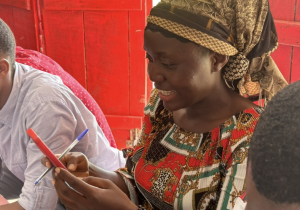
Improving teaching materials
The emergence of AI in education has created a practical avenue for teachers without prior knowledge and skills to independently develop activity-based learning resources using technology. Access to different tools for planning lessons has enabled teachers to create more engaging classroom activities and help to ensure that learning is interactive.
“The tool suggested games (scrabble and others) as one of the best ways to help students learn vocabulary. This increases the curiosity levels of the students in wanting to learn more, whilst playing. It's about blending what the kids like, to help them learn more.” one respondent explained.
Adapted learning
Using AI-driven platforms can provide teachers with tailored learning experiences based on their students’ abilities and needs. These tools help teachers assess students’ strengths and weaknesses and adjust lessons accordingly, ensuring that no student is left behind. One school leader noted “For students in our schools, AI tools help by giving lessons that match how each student learns. Whether you need extra help or can move faster, AI helps you learn at your own pace.”
Many educators also reported that using AI tools helped students develop skills, such as critical thinking, problem-solving, and digital literacy, that are transferable to other areas of life.
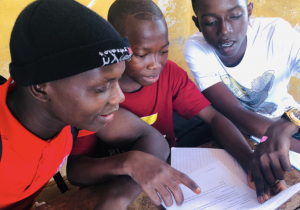
Increasing teachers’ knowledge and confidence
Teachers also reported that the use of these tools led to increased confidence in their teaching, due to having better understanding of the subject matter in addition to improved lesson activities. Many users reported using the platforms for the clarification of concepts:
“My use of AI informed me more about the topic and boosted my confidence level as I ran the sessions.” AI tools can help overcome challenges faced by teachers who have not been able to access up to date and high quality training.
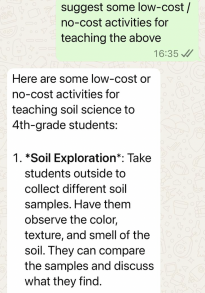
Overcoming remoteness
The use of AI tools was also reported to help in overcoming barriers of remoteness and having limited teaching tools in the classroom. With many teachers working in remote settings, and having limited access to teaching aids and materials, the use of AI offered innovative methodologies for presenting topics using low-cost / no-cost materials available in whatever context, no matter how remote.
A positive force?
All EducAid teachers across EducAid’s sites and school improvement projects in 2025 reported to now be using AI to improve their teaching, showing great willingness to engage and use new tools. The majority of teachers and teacher trainers using AI in teaching have perceived this as an overall positive force in education (64.8% of those responding). While AI offers promising opportunities, its implementation in the Sierra Leonean education system also comes with challenges and many staff members also noted challenges in its use.
Constraints to progress
Our respondents noted that several key factors must be addressed to fully democratise the use of AI tools for good in education. Primarily, teachers need more than one initial training on how to use AI effectively. They need ongoing coaching support once they start testing the tools: “Sometimes AI gives outdated information or errors...” one teacher explained. Teachers need to learn how to query AI outputs and how to reflect on which aspects to adopt, which aspects to adapt, and which aspects to ignore.
“Learning how to use AI effectively takes time, and not all teachers receive proper training on how to integrate these tools into their teaching”. Through EducAid’s work, all staff receive training and coaching on how to use AI tools, and we have trained hundreds of other teachers across the country. A key area for the success of these programmes has been through the provision of ongoing in-school coaching on how the tools can best be used to provide content and identify associated skills, as well as suggesting activities for practising these skills.
As reliable internet access and electricity are crucial to supporting these tools, another major constraint for our teachers surrounds network and infrastructure “One major challenge using AI is the network issues” one teacher explains, “This slows down the process of generating information quickly. Most schools lack internet facilities to access the tools.”
Most schools in Sierra Leone have limited access to electricity which affects the ability to charge devices and access the internet. This highlights the importance of these tools being available on low bandwidths or even offline. Using familiar and accessible applications such as WhatsApp to drive them is also key.
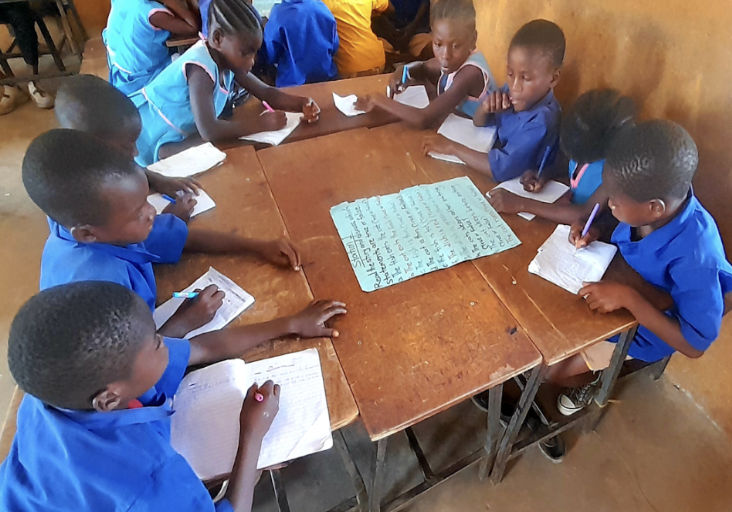
AI for the future
Our respondents noted that to be able to continue using AI tools in the future that they need to be affordable, regularly updated, and widely accessible. The roll out of free or low-cost AI solutions allow for these benefits to be more attainable for all schools and students across the country.
“While AI has the potential to enhance teaching and therefore learning, it cannot replace the teacher,” says EducAid’s Country Director, Dr Miriam Mason-Sesay. EducAid’s work has shown that the power of AI is adapting and learning to use these powerful tools in different contexts, offering more ways to support teachers in their teaching - and allowing more children access to quality education, but materials that AI tools generate should be reviewed and sense-checked by the teacher.
“AI is best understood as Augmented Intelligence, where it can be seen as a tool for augmenting what we can do unassisted. It is not a replacement for our own intelligence, but a tool that gives teachers a helping hand in their design of lessons” Dr Mason-Sesay concludes.
Ongoing learning and sharing
We would love to hear from you about your stories of AI in action in the classroom, particularly in challenging contexts. Please do get in touch with your photos, your stories and your questions. Let’s get this conversation going: hello@educaid.org.uk
Find out more about EducAid’s work using technology to drive learning outcomes and close the digital divide: https://www.educaid.org.uk/technology/
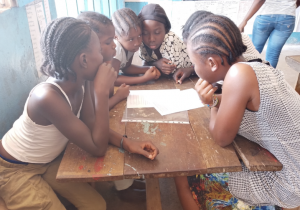
Piece written by Kabiru Mansaray, Foday Kalokoh, Dr Miriam Mason Sesay and Abby Couralis (EducAid Sierra Leone: March 2025)